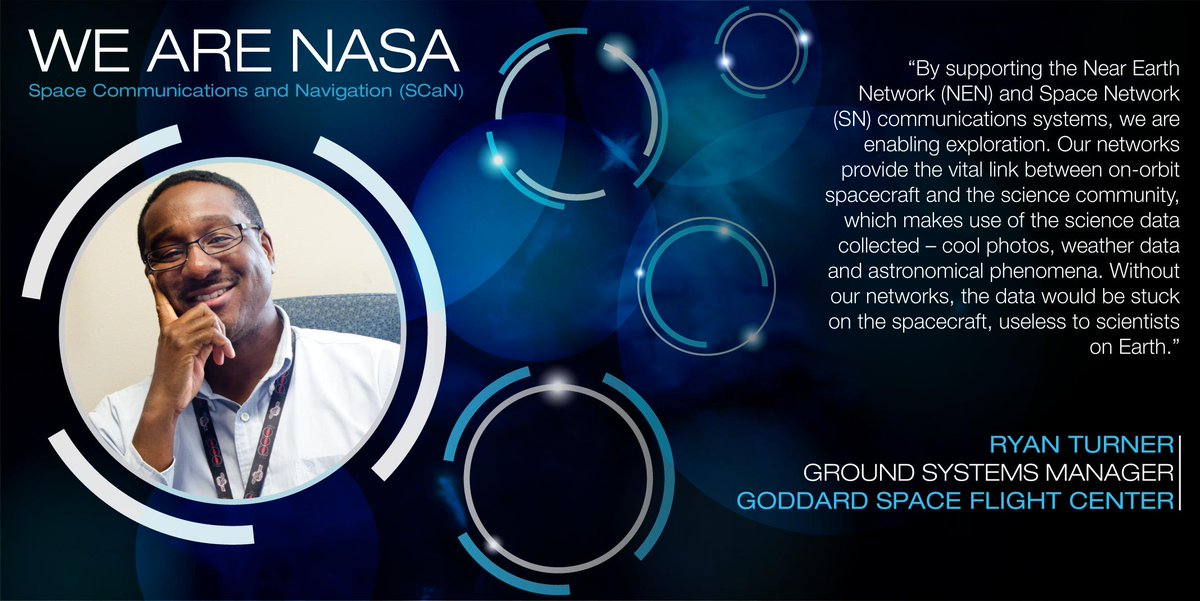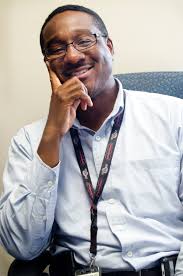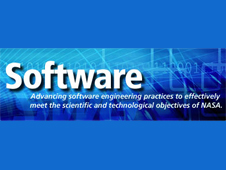STEM Career Connections
Meet Ryan Turner, Ground Systems Manager

Job Title
Ground Systems Manager
Ryan Turner
Bio
What makes your job at NASA exciting or unique?
My career has focused on software and software is ubiquitous, so I have been involved in many different projects. There is a lot of flexibility with software. I’ve worked on projects ranging from real-time displays of sounding rocket trajectories to enterprise messaging software tools for spacecraft operations centers. Recently, I led an intern team that created a website called Space Communications and Navigation (SCaN) Now, which displays real-time Near Earth Network (NEN) and Deep Space Network (DSN) antenna activity. Working with the NEN has given me the opportunity to step outside of the software role. For example, I was the project lead for the acquisition and deployment of the AS3 antenna at the Alaska Satellite Facility, which is now fully operational.
How does your position contribute to NASA’s mission of exploration?
By supporting the NEN and Space Network (SN) communications systems, we are enabling exploration. Our networks provide the vital link between on-orbit spacecraft and the science community, which makes use of the science data collected – cool photos, weather data and astronomical phenomena. Without our networks, the data would be stuck on the spacecraft, useless to scientists on Earth.
What is your favorite thing about working for NASA?
One of the best things about working at NASA’s Goddard Space Flight Center (GSFC) is the diversity in work opportunities. We are gifted with this large center that houses so many intelligent people doing vastly different work. It is never dull. I have had the opportunity to work on many different projects, which keeps both life and work interesting. Goddard also has so many events and clubs to celebrate its workforce. I have been a member of a few center-wide committees, including the Multicultural Advisory Team and the Celebrate Goddard Day team.
› We Are NASA SCaN Image Gallery
Last Updated: March 27, 2019
Credit: NASA Goddard Space Flight Center
NASA Professional Profile
The cycle of Ryan Turner’s career has been built on a strong foundation of mentoring. Beginning at a young age, he was the mentee of many mentors that helped to shape, form, and push him to the individual he is today. Mentoring molds a multi-dimensional person aware of themselves, their role in the world, and others. Because he is so grateful for the positive mentorship experiences, he too chooses to give back.

As a high school SHARP, Summer High School Apprenticeship Research Program, an intern at WFF, Ryan’s technical goals were to learn software development. He began an early age in Communications by building applications for WFF Range Control Center. The group of mentors who built him up also focused on processes, presentations, writing skills, and teamwork.
He continued as a co-op in college with the same group at WFF. The group was innovative through their entrepreneurial mindsets, always understanding their customer needs to be at the forefront of their development. He was a part of a team.
Later as Ryan continued the lifeline of interns, as he became a mentor, he then discovered the value of interns on the team. As roles reversed, he became dependent upon interns to be the youthful spark of uninhibited innovation. With the right selection, an ambitious intern can get the fire started on any project. He reflects on many instances of amazement when he’s given a group of interns a problem and they return with a schedule and requirements document.
He’s built a continuous team of interns who work symbiotically to achieve many tasks. Once he had his process model in place, his interns can work independently to build their own sub-products. He’s set a firm foundation for his intern team to allow them to put their best efforts towards a task. Each intern has a specific task that contributes to the whole.
Learning from entrepreneurial mentors allowed Ryan to see the perfect opportunity a couple of years ago. When he found out about a product, DSN Now, he was instantly inspired to create one for the NEN. As his own venture, it would involve limited time and funding. Immediately, he resourced his intern experience as an opportunity to merge the two. Now, for two full summers and university semesters in between, Ryan has built a continuous pipeline of software engineers to not only create the product but extend its capabilities and reach.
Last, the core of Ryan’s work is the need to help our future generations get engaged, continue motivation, and build our future STEAM workforce. With his grassroots approach to mentoring, his influence will grow as a role model to others. With this approach, our team at NASA will continue to lead a legacy of innovation for the world.
Read more about ESC’s Intern Program.
Credit: NASA Goddard Space Flight Center



